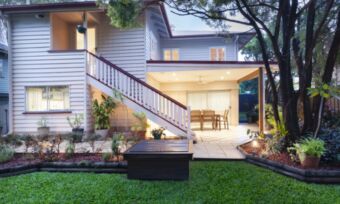House buying checklist
Here’s a checklist of important things to consider when buying a house.

Here’s a checklist of important things to consider when buying a house.
It’s a feeling that may be common to those who spend their Saturday mornings out looking at houses for sale—after walking through numerous properties that you thought ticked all your boxes, you step in the front door of a house and think: ‘Yes, this is the one!’
You’re giddy with joy and may even feel an urge to put an offer in on the spot, but it’s important to keep a cool head in these situations and consider the pros and cons of the property. That’s where our handy buying a house checklist could help.
Here’s our checklist for things to consider when buying a house; from the location and layout of the property through to potential risks.
11 things to consider when buying a house
When you’re in the market for a house, either as a forever home or as an opportunity for capital growth, there are some important things to ponder when determining if you’ve truly found the right one for you. Here are 11 things to consider when buying a house:
- Is the house close to friends, family and facilities?
- Does the layout of the house suit your needs?
- Are there any regulations that can affect what you do with the property?
- Are the building and roof structurally sound?
- What are the neighbourhood noise levels like?
- Does the house have good natural light?
- Does the house have adequate facilities?
- Are there any planned developments nearby?
- Are the garden and outdoor areas suitable?
- Is the property at risk of flooding?
- Can you afford to buy and fund the ongoing costs?
1. Is the house close to friends, family and facilities?
This is a question only you can answer based on your needs and priorities, but when purchasing a new home to live in, it’s worth considering how your work and social lives will fit in. Is the house in a suburb that’s convenient for you to get to work? Will you be close to friends and family and the people that you most want to see? Is the suburb in a sleepy suburban area, or will you be close to cafes and cultural attractions, if that’s a priority? All these are questions that are worth considering before making an offer on a house.
Similarly, it’s important to consider the neighbourhood amenities. Is it close to schools, if you have children? Likewise, are there parks or other green spaces nearby, and are you within a convenient distance of things like shops and public transport? Can you walk to nearby facilities, should you wish to do that, or will you need to drive or catch a bus? The proximity of a house to various amenities can help determine if it’s the right place for you.
2. Does the layout of the house suit your needs?
The number and configuration of rooms can be an important deciding factor in purchasing a house. For example, a small, low maintenance house may be desirable to you now, but if you’re planning to start a family or have more kids, then you will need to consider how many bedrooms and bathrooms you will need to comfortably house your family.
Similarly, if you or your partner work from home, are there rooms that can be used as office spaces, where it will be possible to work comfortably and without distraction? Is there sufficient storage space for all your things, perhaps even a walk-in cupboard, or will you need to install some? Is there sufficient parking space for you, as well as for your visitors?
The layout of the rooms within the property itself is also an important factor. For example, rooms that face the west can warm up significantly in the afternoon sun, so it’s important to get a sense of where the sun rises and sets, so you know that a bedroom or living area will not get uncomfortably hot in the later parts of the day.
Likewise, if the bedrooms of a property come directly off the living room, you may need to consider whether noise from the TV or video games will be an issue at night. If they come directly off the kitchen, will cooking smells be a problem?
Questions like these are all worth considering when buying a house. Assessing whether you will need to undergo any significant renovations in order to bring the property up to the standard and layout you desire.
3. Are there any regulations that can affect what you do with the property?
If you’re buying with the plan to renovate, rebuild or extend the house, it’s important to check whether there are any zoning, heritage, strata and/or building regulations that may impact your property. Generally your conveyancer can provide you with the necessary information.
It’s also important to talk to your conveyancer about what the title deed for the property entails, as the property may have encumbrances (restrictions on how the property can be used) and easements (pathways that allow certain parties to access your property e.g. utility providers). Knowing about these regulations before you buy can help you to avoid financial heartache if your planned project was stopped due to these restrictions, especially if you’ve already spent money on them.
4. Are the building and roof structurally sound?
While you can get a sense of how structurally sound a house may be by looking at it, there is always the potential for hidden structural defects and flaws. For this reason, a building and pest report is advisable before you decide on the purchase of a house.
A building and pest inspection can identify various issues with a house; ranging from structural problems to pest and termite activity to areas that will be in need of repair. Sometimes, a seller will obtain one and provide it on request, otherwise, you can organise one yourself.
Generally speaking, if you make an offer on a house, you will be able to make this offer conditional on the findings of a building and pest report. This means that if you make an offer but the report comes back and identifies significant issues or things that are deal-breakers, then you can withdraw the offer.
A building and pest report can even sometimes be a negotiating tool. For example, if the inspector finds a quantity of asbestos in a house, then you may be able to ask the seller to knock some money off the price to cover the cost of having it removed, or having any other defects repaired.
It’s important to keep in mind that if you are buying at an auction, the sale is considered ‘unconditional’ when the hammer falls. That means you have bought the house as is, regardless of any defects that may be present.
Related: Pre-purchase house inspection checklist
5. What are the neighbourhood noise levels like?
Before purchasing a property, it may be advisable to get an idea of what the neighbourhood noise level is like. Many property inspections are held on Saturdays, when a street may be relatively quiet, but if a property is near a school or major road, then it may be significantly noisier on a typical weekday.
If the property you are buying is in an area close to a university, then will noisy parties be an issue on nights or weekends? Likewise, if the property is near a strip of cafes or restaurants, then will noise at peak hours be an issue? You may even find that the property is under an existing or planned flight path, which could be significantly noisy at certain times of day.
There are some signs you can identify that may be clues as to whether a property is noisy. For example, if the agent insists on keeping doors and windows shut as buyers walk through, or plays music in a particular part of the house, then they may be trying to muffle noises from outside.
If you are curious, you may be able to ask neighbours in the street for their impression of local noise levels or visit the area at different times throughout the week to better gauge the noise level. Researching nearby amenities and infrastructure may also give you some idea as to the noise level you may contend with.
6. Does the house have good natural light?
This may seem like a minor consideration, but a lack of natural light can really have an impact on the attractiveness and aesthetic appeal of a house, even if you don’t realise it when you’re inspecting the home. If the house is overlooked by shadows or is dingy and dark at certain times of day, your enjoyment may also be dimmed.
While there is no foolproof way to guarantee that a house will have natural light, it can be worthwhile to see if the house is north-facing to take advantage of the sun throughout the day.
The comparison rate for all home loans and loans secured against real property are based on secured credit of $150,000 and a term of 25 years.
^WARNING: This comparison rate is true only for the examples given and may not include all fees and charges. Different terms, fees or other loan amounts might result in a different comparison rate.
 Owner occupied
Owner occupied
 20% min deposit
20% min deposit
 Redraw facility
Redraw facility
 Owner occupied
Owner occupied
 10% min deposit
10% min deposit
 Redraw facility
Redraw facility
 Owner occupied
Owner occupied
 20% min deposit
20% min deposit
 Redraw facility
Redraw facility
Canstar may earn a fee for referrals from its website tables, and from Sponsorship or Promotion of certain products. Fees payable by product providers for referrals and Sponsorship or Promotion may vary between providers, website position, and revenue model. Sponsorship or Promotion fees may be higher than referral fees. Sponsored or Promoted products are clearly disclosed as such on website pages. They may appear in a number of areas of the website such as in comparison tables, on hub pages and in articles. Sponsored or Promoted products may be displayed in a fixed position in a table, regardless of the product’s rating, price or other attributes. The table position of a Sponsored or Promoted product does not indicate any ranking or rating by Canstar. For more information please see How We Get Paid.
7. Does the house have adequate facilities?
A house may look lovely, but if it does not have adequate facilities for day-to-day living, then you may have work (and extra costs) to think about down the line. Things to look for could include:
- Adequate lighting to keep the home well-illuminated at night (e.g. downlights)
- Air-conditioning and/or heating, if this is a priority for the warmer or colder months
- A functioning hot water system
- Sufficient water pressure
- Adequate internet access, especially if this is needed for work
- Sufficient power points for your needs
- Somewhere covered to park your car, if that’s a priority.
Some of these are things you may be able to observe for yourself, and others you may need to ask the real estate agent about. If a property is in need of a new or upgraded air conditioning or hot water system, then it is worth keeping the potential cost of this in mind.
8. Are there any planned developments nearby?
It can be troubling to learn that the quiet street you thought you’d bought on is now a noisy, busy construction zone. So before you settle on a property, it’s important to find out if there are any planned developments on the street itself or in the surrounding area.
A drive around the neighbouring streets will give you an initial idea of any work currently happening, but you may also wish to check with the local council as to whether there are any approvals in place or applications in the pipeline.
If there are any significant construction or infrastructure projects coming up in the area, think about whether this is a deal breaker or simply a bargaining chip when it comes to the price you end up offering for the property.
Planned developments nearby are not necessarily a downside, though. You may find, for example, that a planned railway station or school construction nearby could cut your commute times, and even make the property more valuable down the line, if you’re considering capital growth.
9. Are the garden and outdoor areas suitable?
Depending on your needs, you may want a property that has minimal outdoor space, or you may want one with a more substantial outdoor area. Do you want a grassed area for children to play or dogs to run around on, or do you want to put in a garden? Does the backyard have a significant slope, and if so, are you happy with this or would you want to landscape it?
It’s also important to consider the ease of maintaining a yard or outdoor area. A large grassy area may simply require regular mowing, whereas a more landscaped area with plants and garden beds could require more careful maintenance. A sloped block could also present more of a challenge in terms of lawn mowing. It’s important to consider how much time you plan to spend outside, and how much work you are willing to put in to maintain a yard.
10. Is the property at risk of flooding?
The past few years have seen Aussies contend with a variety of natural disasters and extreme weather events, from devastating bushfires to the inundation of entire towns. It’s therefore important to assess whether your property is at risk of such an event. The occurrence of natural disasters is an important consideration when buying a house.
Local councils keep flood maps, which can tell you whether the street you plan on buying on, or the house itself, is in an area at significant risk of water flow or flooding. This may be a significant factor in your decision, especially when it comes to considering home and contents insurance. The property’s flood risk will impact how much you are likely to pay in premiums as well as what you’ll be covered for in the event of a flood.
It’s worth thinking about whether the property you plan to purchase is in an area that is or has been prone to other natural disasters such as cyclones or bushfires, as this could also have implications on both your home insurance premiums and overall quality of life, should another natural disaster strike.
11. Can you afford to buy it and fund the ongoing costs?
A major factor to consider when buying a house is if it fits into your budget. If you have obtained home loan pre-approval (or conditional approval), you’ll have a good idea of how much you are able to spend and how much your repayments might be. The lender is likely to do a property valuation prior to giving you a home loan, which could impact the amount of money they will lend to you. It could be worth taking a look at property prices in the area to make sure that it’s within reason.
You may also have to pay mortgage related fees, such as application/establishment, valuation, legal and settlement fees, as well as stamp duty, as part of the settlement process. Other mortgage fees like annual package or ongoing monthly fees may also be incurred during the term of your home loan.
While home ownership comes with a list of expenses far too long to cover entirely, a few of the important things to budget for when buying a house include:
- Council rates, strata title fees, body corporate fees: Will they be more, less, or similar to the rates you were paying in your previous location?
- Utilities costs: Utilities bills such as electricity and gas can vary depending on the suburb your property is located in, as well as the state or territory, and how energy efficient the home is. It can be a wise idea to make sure that you know what you’re likely to be paying for them before you move.
- Home and contents insurance: Your possessions may have not changed, but moving to a new home and a new area can have an impact on your insurance premiums, so be sure to take that into consideration.
- Maintenance: A timber house will require painting after a certain period of time and amenities like swimming pools require regular work and chemicals to keep them clean and functioning.
If you’re in the market for a new property, you can compare home loans, including first home buyer and investment property loans, with Canstar. Canstar also compares home and contents insurance. It’s important to read all relevant documentation, such as the Product Disclosure Statement (PDS) and Target Market Determination (TMD), for any loan product or insurance policy you are considering.
Taking out a home loan is a large financial commitment, which is why it’s recommended that you obtain professional financial advice before doing so.
The comparison rate for all home loans and loans secured against real property are based on secured credit of $150,000 and a term of 25 years.
^WARNING: This comparison rate is true only for the examples given and may not include all fees and charges. Different terms, fees or other loan amounts might result in a different comparison rate.

Up to $4,000 when you take out a IMB home loan. Minimum loan amounts and LVR restrictions apply. Offer available until further notice. See provider website for full details. Exclusions, terms and conditions apply.
 Owner occupied
Owner occupied
 20% min deposit
20% min deposit
 Redraw facility
Redraw facility
 Owner occupied
Owner occupied
 10% min deposit
10% min deposit
 Redraw facility
Redraw facility
 Owner occupied
Owner occupied
 20% min deposit
20% min deposit
 Redraw facility
Redraw facility
 Owner occupied
Owner occupied
 20% min deposit
20% min deposit
 Redraw facility
Redraw facility
 Owner occupied
Owner occupied
 40% min deposit
40% min deposit
 Redraw facility
Redraw facility
Canstar may earn a fee for referrals from its website tables, and from Sponsorship or Promotion of certain products. Fees payable by product providers for referrals and Sponsorship or Promotion may vary between providers, website position, and revenue model. Sponsorship or Promotion fees may be higher than referral fees. Sponsored or Promoted products are clearly disclosed as such on website pages. They may appear in a number of areas of the website such as in comparison tables, on hub pages and in articles. Sponsored or Promoted products may be displayed in a fixed position in a table, regardless of the product’s rating, price or other attributes. The table position of a Sponsored or Promoted product does not indicate any ranking or rating by Canstar. For more information please see How We Get Paid.
Cover image source: Depiction Images/Shutterstock.com
This article was reviewed by our Finance Editor Jessica Pridmore before it was updated, as part of our fact-checking process.

Alasdair Duncan is Canstar's Content Editor, specialising in home loans, property and lifestyle topics. He has written more than 500 articles for Canstar and his work is widely referenced by other publishers and media outlets, including Yahoo Finance, The New Daily, The Motley Fool and Sky News. He has featured as a guest author for property website homely.com.au.
In his more than 15 years working in the media, Alasdair has written for a broad range of publications. Before joining Canstar, he was a News Editor at Pedestrian.TV, part of Australia’s leading youth media group. His work has also appeared on ABC News, Junkee, Rolling Stone, Kotaku, the Sydney Star Observer and The Brag. He has a Bachelor of Laws (Honours) and a Bachelor of Arts with a major in Journalism from the University of Queensland.
When he is not writing about finance for Canstar, Alasdair can probably be found at the beach with his two dogs or listening to podcasts about pop music. You can follow Alasdair on LinkedIn.
- 11 things to consider when buying a house
- 1. Is the house close to friends, family and facilities?
- 2. Does the layout of the house suit your needs?
- 3. Are there any regulations that can affect what you do with the property?
- 4. Are the building and roof structurally sound?
- 5. What are the neighbourhood noise levels like?
- 6. Does the house have good natural light?
- 7. Does the house have adequate facilities?
- 8. Are there any planned developments nearby?
- 9. Are the garden and outdoor areas suitable?
- 10. Is the property at risk of flooding?
- 11. Can you afford to buy it and fund the ongoing costs?
The comparison rate for all home loans and loans secured against real property are based on secured credit of $150,000 and a term of 25 years.
^WARNING: This comparison rate is true only for the examples given and may not include all fees and charges. Different terms, fees or other loan amounts might result in a different comparison rate.
 Owner occupied
Owner occupied
 40% min deposit
40% min deposit
 Redraw facility
Redraw facility
Try our Home Loans comparison tool to instantly compare Canstar expert rated options.
The comparison rate for all home loans and loans secured against real property are based on secured credit of $150,000 and a term of 25 years.
^WARNING: This comparison rate is true only for the examples given and may not include all fees and charges. Different terms, fees or other loan amounts might result in a different comparison rate.






